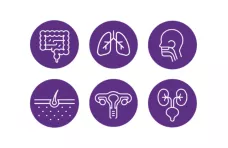Mexico 2024: knowledge and behaviors about microbiota
The survey was conducted by Ipsos among 7,500 people in 11 countries (Mexico, France, Spain, Portugal, Poland, Finland, United States, Brazil, Morocco, China, and Vietnam).
Mexico: significant progress observed this year thanks to increased awareness by healthcare professionals.
1. In Mexico, knowledge of the microbiota has increased significantly since last year

7 out of 10 people have already heard of the microbiota (+5 points vs. 2023, 70% overall). However, only 1 in 5 Mexicans know exactly what microbiota is (21%, +1 point vs. 2023, 23% overall).
As for the other microbiota, the intestinal microbiota is the best known of all: 31% of Mexicans know exactly what it is (+5 points vs 2023, 26% overall). Next come vaginal microbiota known precisely by 22% (+2 points vs. 2023, 20% overall), and oral microbiota known precisely by 20% (+3 points vs. 2023, 20% overall).

Learn all about microbiota
Find out more...Mexico also stands out for its greater familiarity with the term "flora" : 77% know exactly what intestinal flora is (+4 points vs. 2023, 56% overall).
Their knowledge of the role and functions of microbiota remains stable compared to last year, and close to global results.
know that their diet has an impact on the balance of the microbiota (+1 point vs. 2023, 78% overall)
know that an imbalance of the microbiota can have significant consequences on health (-2 points vs. 2023,
77% overall).

Microorganisms: key for human health
Find out more...
2. Mexicans are more likely to change their behaviors to maintain a balanced microbiota
More than half of them have changed their behaviors to maintain a balanced microbiota (67% vs. 58% overall), out of which 19% do so a lot (vs. 17% overall).
They stand out for their high consumption of
(sidenote:
Probiotics
Live microorganisms that, when administered in adequate amounts, confer a health benefit on the host.
FAO/OMS, Joint Food and Agriculture Organization of the United Nations/ World Health Organization. Working Group. Report on drafting guidelines for the evaluation of probiotics in food, 2002.
Hill C, Guarner F, Reid G, et al. Expert consensus document. The International Scientific Association for Probiotics and Prebiotics consensus statement on the scope and appropriate use of the term probiotic. Nat Rev Gastroenterol Hepatol. 2014;11(8):506-514.
)
(66% vs. 50% overall) and
(sidenote:
Prebiotics
Prebiotics are specific indigestible dietary fibres which have effects that are favourable to health. They are used selectively by the beneficial micro-organisms in the microbiota of individuals. Specific products combining probiotics and prebiotics are known as symbiotics.
Gibson GR, Hutkins R, Sanders ME, et al. Expert consensus document: The International Scientific Association for Probiotics and Prebiotics (ISAPP) consensus statement on the definition and scope of prebiotics. Nat Rev Gastroenterol Hepatol. 2017;14(8):491-502.
Markowiak P, Śliżewska K. Effects of Probiotics, Prebiotics, and Synbiotics on Human Health. Nutrients. 2017;9(9):1021.
)
(56% vs. 44% overall).

What exactly are probiotics?
Find out more...However, the vast majority of Mexicans wash more than once a day, even though this practice is harmful to their microbiota (96%, vs. 59% overall).
3. In Mexico, information provided by healthcare professionals is more frequent than in other countries, and has increased since last year
4 out of 5 Mexicans consider healthcare professionals as the primary source of reliable information about the microbiome (81% compared to 78% overall).
have been informed by their healthcare professional about what the microbiota is and what it is used for (+7 points vs. 2023, 45% overall).
have been made aware of the importance of preserving the balance of their microbiota (+8 points vs. 2023, 48% overall).
have received information on behaviors to adopt to maintain the balance of their microbiota (+4 points vs. 2023, 48% overall).
Mexicans are also more likely to have received information when prescribed antibiotics, even if this is still only provided to a minority of them: 45% have been made aware of the negative consequences of taking antibiotics on the balance of their microbiota (+7 points vs. 2023, 39% overall).
Impact of antibiotics on the gut microbiota
Find out more...In summary
In Mexico, knowledge of the microbiota has progressed significantly this year. More Mexicans are adopting practices that promote the balance of their microbiota, thanks to proactive information from healthcare professionals. The awareness of Mexicans must now be extended to all types of microbiota, beyond the intestinal microbiota.

Methodology
This second edition of the International Microbiota Observatory was conducted by Ipsos on 7,500 individuals across 11 countries (France, Spain, Portugal, Poland, Finland, Morocco, the USA, Brazil, Mexico, China, and Vietnam). Four new countries were included in this second edition: Poland, Finland, Morocco, and Vietnam.
The survey was conducted over the Internet between January 26 and February 26, 2024. For each country, the sample is representative of the population aged 18 and over in terms of :
- gender
- age
- profession
- region
Representativeness was ensured via quota sampling, the most commonly used sampling method for obtaining a representative sample of the population studied. The quota variables for each country were gender, age, region, and socio-professional category. The data were adjusted:
- within each country, again to ensure that each population is representative
- globally, so that each country has the same weight. Statistical analyses were carried out using Cosi software (M.L.I., France, 1994), with a significance level of 95%
The survey population was 48% male and 52% female. The average age was 46.1 years. The sample of 7,500 individuals made it possible to carry out a detailed analysis by age group:
- 18-24
- 25-34
- 35-44
- 45-59
- 60 and over
Changes from one year to the next have been measured on a like-for-like basis, i.e. calculated taking into account only those countries present in both the first and second editions of the survey. While we do have results for the new countries included in this second edition (Poland, Finland, Morocco, and Vietnam), they have not been taken into account when calculating trends, since they were not included in the first edition of the survey.
The questionnaire includes 27 questions on:
- socio-demographic data
- the level of knowledge about microbiomes
- the level of and desire for information from healthcare professionals
- the identification and adoption of behaviors designed to combat microbiome imbalances
- the level of knowledge, information, and behaviors of women about the vulvo-vaginal microbiome
- health data
The questionnaire lasted ten minutes and the 7,500 individuals had to complete the entire questionnaire in order to be included in the survey. The terms used in the questionnaire to talk about the microbiome have been translated and adapted to the terms used in each country.


